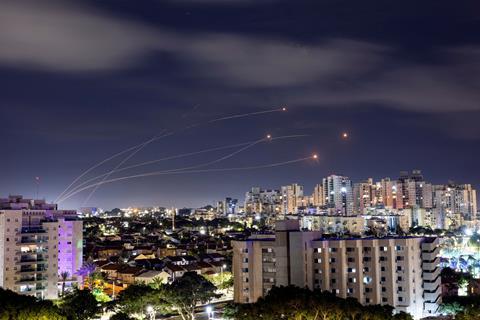It’s easy to say ‘we should pray’. But in analysing prayers and statements from churches across the globe, Tim Wyatt uncovers some very different approaches to the conflict

The news from the Holy Land has been almost unbearable in recent days. Ever since the massive attack by Hamas on Israel was launched, Christians around the world have been sickened, shocked, and depressed by the horrific stories emerging. Babies murdered in their bedrooms. Gunmen going from door to door shooting everyone they find. Terrorists ambushing youngsters enjoying a music festival and killing hundreds. Rockets raining down on towns with only seconds’ warning. Hostages aged eight to 80 dragged from their homes at gunpoint. Apartment blocks razed by missile strikes. Hospitals overwhelmed by the dead and injured, and fast running out of fuel and supplies. Millions cut off from water and electricity.
The dead in both Israel and Gaza already number more than 4,000. In the face of such suffering and tragedy, it is natural believers everywhere long to turn to God in prayer. But what and how can we pray, in the midst of such a polarising and bitterly divisive situation? Do we have to take sides in our efforts to lift up the situation to God? Is it even possible to pray something which neither side would object to?
Prayers released by the United Reformed Church were unusually honest in summing up how many Christians feel. “O Lord, we hear the news and don’t know what to say, we see those scenes of violence and don’t know how to pray; we read of people fighting over the Land and know it was ever thus. We hear of international outrage and messages of support, but know there’s more to this complex story of land, justice, faith, security, and history than can be encapsulated in easy sound bites. We watch, listen, read, and try to pray but there are no words in us.”
Peace and safety
Many public calls for prayer have chosen the safe route of praying solely for anyone injured or suffering because of the violence. For instance, Pope Francis said in his weekly address at the Vatican: “I express my solidarity with the relatives of the victims, and I pray for all those who are experiencing hours of terror and anguish.” A similar message came from the secretary general of the Anglican Communion, the Rt Rev Anthony : “I weep for the peoples of the region and pray for peace. In particular, I pray for the safety of all civilians — whether residents or tourists and pilgrims — and I pray for a cessation of violence.”
Others have taken to focusing prayer around peace, a sentiment also impossible to quibble with. “In these trying times, we come together to raise our voices in unity, echoing the divine message of peace and love for all humanity,” said a joint statement from the heads of the different Christian churches in Jerusalem. The director of the Christian-run Al-Ahli Arab hospital in Gaza agreed: “Please pray with us that this wave of violence will be stopped, as there are no winners in wars. All are losers.”
Going further
But other Christians have pushed beyond unobjectionable prayers for peace. They see the situation in Israel as one with obvious victims and obvious perpetrators, and have less hesitation in calling for God to uphold the former.
The head of the US group the Congress of Christians Leaders said Christians should “pray for the security of Israel” and stand with the nation reeling from its worst ever terror attack. Pastor EA Adeboye, head of the Nigerian-based Redeemed Christian Church of God, issued a message addressed to the people of Israel which said: “I want you to know that we are praying for you, that all members of the Redeemed Christian Church of God all over the world are standing by you at this critical moment. The Almighty God, the only one of Israel, will give you absolute victory and give you permanent peace from now on in the mighty name of Jesus.”
The Almighty God, the only one of Israel, will give you absolute victory
Many Christians feel strongly that now is not the time for equivocation about previous wrongs committed by Israel, but for resolute solidarity in the face of the bloodiest day for Jews since the Holocaust.
One Bible passage which has been shared countless times is from Psalm 122: “Pray for the peace of Jerusalem: May those who love you be secure. May there be peace within your walls and security within your citadels.” While some use it explicitly in support of Israel, others have noted the modern-day city is full of Jews, Christians and Muslims, Israelis, Palestinians and countless other nationalities. And so lifting up this melting-pot of a city and praying for peace within its walls is also a prayer for unity and harmony between every community.
But given the preponderance of Old Testament passages about Israel, it is tempting to neatly apply promises and prayers from scripture to the present situation. One prayer shared widely cites a litany of verses: “You said that the nation of Israel would never cease as a nation from before You as long as the ordinances in the sky remain (Jeremiah 31:36)…Let all who bless Israel be blessed (Genesis 12:3)…We pray for Israel’s armies to be strong and courageous. Let their hearts not be afraid. For You, the Lord our God, are the One who fights for Israel against her enemies, in order to save Israel (Deuteronomy 20:4)…”
Christians debate vigorously the different theological approaches to contemporary Israel, but some, such as US-based pastor Paula White have had no qualms with offering unconditional support: “We stand with God. Israel is God’s place. The Jewish people are God’s people. And we know that is their sovereign land. We stand with them in every single way.” Intercessors for Israel have been similarly unequivocal, inviting their supporters to pronounce “Do not fear for I am with you” (Isaiah 41:10) over the Israeli army, and adding, “Lord, provide the [Israel Defense Forces] such miraculous success against Israel’s enemies that the world, especially the Muslim nations, will need to confess that You are with them.”
A forgotten cause?
Other believers have swung the other way, particularly those already passionate about advocating for Palestinians. These Christians say their cause is oft-forgotten and sometimes deliberately ignored. For them, God cannot be solely on the side of the Israelis as long as Palestinians are mistreated and the West Bank is under Israeli occupation. Churches for Middle East Peace, a coalition of pro-Palestinian denominations in the United States, condemned Hamas’s attacks on civilians while also urging advocacy for the desperate plight of innocent. “People of faith and goodwill cannot turn a blind eye to the devastation in Gaza,” the group urged. Christians must pray for peace, they added. “Not an empty peace devoid of justice, equality, and hope for all people, but a deep, lasting, and just peace that addresses core systemic issues of the conflict, from Palestinian needs for self-determination and freedom to Israel’s needs for safety and security.”
This message was echoed by Palestinian Christians. One Palestinian pastor, Botrus Mansour had focused a church service around the prayer of Francis of Assisi: “Make me a tool for your peace.” “People are angry about the brutal attack of Hamas” he said. “But they also feel that violence will continue as long as there is no just solution to the conflict.”
Ultimately, for followers of Jesus caught between the violence of the two much larger religious and ethnic communities in the Holy Land, the prayer remains the same as anywhere: “Come, Lord Jesus, come”. The president of the Council of Local Evangelical Churches in the Holy Land, said the now decades-long conflict over territory missed the point. Christians should not pray for either side to win, but for both to turn to Christ. “If either side takes land from the Mediterranean all the way to the Pacific, but does not have Jesus, it is nothing,” he said. “They still need Jesus.”






































1 Reader's comment